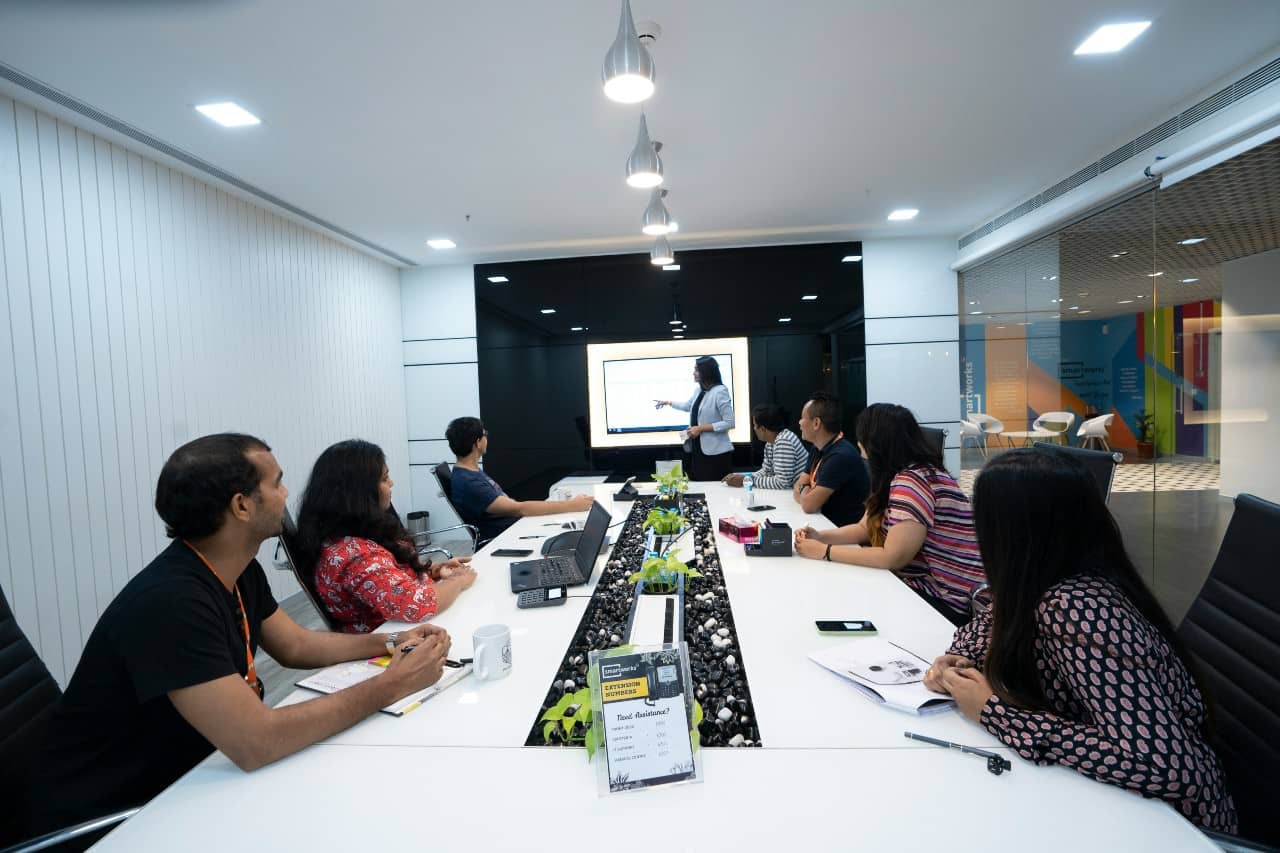This is What Leadership Looks Like in Each Generation
The workforce is currently made up of four distinct generations: baby boomers,
Generation X, millennials, and Generation Z. While this mix of ages offers a
wealth of perspectives and skills to employers, it can present challenges to
companies and leadership — not only in managing different generations, but
also in how each generation perceives leadership of different ages.
No generation is immune to bias. Older generations tend to think young leaders
are inexperienced and entitled, while younger generations see experienced
leaders as old- fashioned and stubborn. But regardless of these perceptions,
each generation has unique leadership strengths.
We’ve taken a realistic look at the biases each generation faces, what they’re
really like, and their leadership strengths and weaknesses to get a true sense
of what leadership at each generational level looks like.
Baby Boomers
Baby boomers are those born between 1946 and 1964 and have been in the
workforce for decades. While many are still working today, research1 from
Gallup in 2015 found that many are starting to retire. About 50 percent of
boomers aged 60 are still working, and only about one-third of those between
the ages of 67 and 68 are still in the workforce.
What employees think
Baby boomers tend to be seen as the keepers of traditional workplace values:
loyalty, progression up the career ladder over time, hierarchy, and the
expectation the company will reward them for their contribution. While these
leaders have the most experience, their younger peers think they are stuck in
the past when it comes to technology and leadership style.
In fact, a survey of professionals ages 45 to 74 conducted by AARP2 in 2013
found 64 percent of these individuals said they have experienced ageism at
work or when looking for a new job.
At the same time, baby boomers can be biased against leaders from younger
generations who favor building relationships with employees and informal
workplace policies.
What they’re really like
In reality, most baby boomers do believe in a traditional workplace hierarchy,
favor formal policies, and take a more hands-off approach to leadership. And
while they may be slower to implement new technology, most recognize the value
it can bring to managing the workforce and the business as a whole.
Leadership strengths
Baby boomers have spent the most time in the workplace overall, meaning they
have the most experience in their industry and in management. Many have been
with their organization for decades, giving them a strong understanding of its
inner workings. They know the business and culture, allowing them to make
informed decisions that will benefit their teams and the bottom line.
In addition, these professionals have benefited from the most leadership
development opportunities. They’ve had the time and resources to grow and
improve their leadership skills.
Leadership weaknesses
While baby boomers are the most experienced group of leaders, they can be slow
to recognize the need for change in the workplace.
When VitalSmarts3 surveyed 1,200 employees in July 2016, they found that while
leaders want to believe they’ve created environments filled with innovation
and teamwork, employees think the workplace is one of obedience, competition,
and predictability.
In addition, senior executives surveyed4 by SuccessFactors were much more
likely to be confident in their company’s ability to recruit skilled workers,
develop talent for the digital workplace, and plan for succession than
millennial executives. And it’s no surprise that only 37 percent of
millennials in the same survey said senior management is proficient in using
technology for competitive advantage.
Because baby boomers favor a traditional workplace hierarchy, leaders are
chosen and promoted based on tenure with the company — instead of skills,
performance, and leadership potential. In fact, 76 percent of employees
surveyed5 by Grovo said ineffective managers at their company are frequently
rewarded or promoted.
Takeaway
Baby boomers may have the most experience in leadership, but that doesn’t mean
they know everything. Leaders in this generation should still strive to
innovate and challenge the status quo, even if they have been using the same
processes and strategies for years.
Generation X
Generation X is generally defined as those born in the mid-1960s through the
late 1970s and early 1980s. Although this generation made up 84 percent of the
workforce in 2008, according to data6 from Pew Research, their workplace
majority was taken over by millennials in 2015.
What employees think
Generation X is the forgotten middle child, overshadowed by baby boomers, who
tend to be their bosses, and outnumbered by millennials, who are quickly
climbing the ranks, ready to take their positions.
But while Generation X is often overlooked, they have huge leadership
potential — 51 percent of those surveyed7 by Future Workplace in 2015 said
that Gen X employees are the most capable generation to lead organizations.
What they’re really like
Generation X as a whole falls somewhere between boomers and millennials when
it comes to
values, leadership style, technology adoption, and other workplace issues.
After watching
baby boomers work around the clock, they’re more focused on work-life balance
than career
advancement.
Leadership strengths
Because Generation X places more value on work-life balance, they focus on the
results, not the time spent on projects. As leaders, they respect the time of
their employees and recognize those who complete quality work. In addition,
Gen X leaders are less formal with their employees. They’re more transparent,
open, and available to their team than boomer leaders.
Leadership weaknesses
While Generation X leaders are more in-tune with the wants and needs of their
employees, they still lack experience and development. In the Grovo survey, 98
percent of middle managers feel managers at their company need more training.
And 87 percent of managers said they wish they had received more training when
they first took on their role.
Takeaway
Generation X has the potential to be great leaders, but they need to gain more
experience. Shadowing senior leadership or presenting the benefits of learning
and development opportunities can help to round-out their skills.
Millennials
Although there is no official definition, millennials are typically classified
as those born between 1980 and 1997. Although older generations tend to see
them as newcomers to the workplace, more than a third of American workers
today are millennials, according to the data from Pew Research.
What employees think
A lot has been said about millennials, and for better or worse, everyone has
their opinion on
the generation. Overall, older generations see millennials as entitled
professionals who overly
rely on technology. After all, 85 percent of millennials surveyed8 by Gallup
access the internet from their phones — more than any other generation.
That reliance on technology isn’t always seen as a bad thing. In fact,
Generation X and baby boomers surveyed9 by Workfront rated millennials as the
most tech-savvy and creative at work. But at the same time, these generations
also rated millennials as the least cooperative, the least likely to take
responsibility, and as the biggest complainers.
And while the majority of the workforce is made of millennials, they’re still
seen as inexperienced. A study10 published in the Journal of Organizational
Behavior in April 2016 found that younger managers face a heightened risk of
being rejected by employees and peers because of their perceived lack of
expertise and status. But just like any other generation, millennials have
unique strengths and weaknesses when it comes to leadership.
What they’re really like
Millennials are ambitious and ready to take on leadership positions in order
to bring big changes to the workplace. They believe in tech and its ability to
transform work, want to invest in innovation, and place greater value on
mentoring and leadership development.
And while millennials are still seen as the newcomers in the workplace, many
are already taking the reigns, implementing changes, and leading older
generations. In fact, a November 2015 survey11 by executive development firm
Future Workplace and career networking company Beyond.com found that 83
percent of respondents have seen millennials managing people from the
Generation X and baby boomer generations.
Leadership strengths
Millennial leaders are more in-touch with employee needs than older
generations. In a September and October 2015 survey of millennials around the
globe conducted by Deloitte, respondents said what leads businesses to long-
term success is employee satisfaction, loyalty, and fair treatment. They adopt
a more inclusive and empathetic leadership style, as they understand the teams
they were a part of not long ago themselves.
With this more employee-centric leadership style comes a greater desire to
change traditional practices across the company. For example, 38 percent of
millennial leaders surveyed by SuccessFactors agreed that their organization
devotes resources to training the next generation of leaders, compared with 48
percent of senior leaders. They understand the importance and need for
development opportunities at every level of the organization, not just those
who are already on top. Millennials want fair opportunities for all employees,
understanding that more development benefits the organization with better
leaders.
In addition, while older generations are more comfortable with the way things
have always been done, millennial leaders are much more likely to question
these traditions. In the SuccessFactors survey, millennial executives were
less confident in their organization’s ability to develop talent for the
digital workplace and plan for succession than their peers of older
generations.
Leadership weaknesses
While millennials leaders are pushing for change within their organizations,
many feel they don’t have the skills to do so. Overall, 63 percent of
millennials in the Deloitte survey said their leadership skills aren’t being
fully developed. And while many lead older employees every day, over one-third
of millennials surveyed by Future Workplace and Beyond.com said doing so is
difficult. So while millennials place less value on the traditional workplace
hierarchy, it still exists, complicating their ability to lead effectively.
Millennials aren’t the only ones who feel they don’t have the right skills for
leadership positions — older generations feel the same way. In the same
survey conducted by Future Workplace and Beyond.com, 45 percent of baby boomer
and Gen X respondents said that millennials’ lack of managerial experience
could have a negative impact on a company’s culture.
Takeaway
While millennials catch a lot of flack from other generations, they are
innovative leaders. They also look beyond traditional ways that things get
done and are eager to contribute even if it means breaking hierarchy
protocols.
But despite all their exciting new ideas, they still need to develop their
finer leadership skills. Expanding learning and development opportunities and
following older leaders, even if they same outdated, can help transform
inventive millennials into effective and dynamic leaders.
Generation Z
Generation Z is typically defined as those born in the late 1990s through the
early 2010s. This generation is young, and only the oldest of this cohort are
starting to enter the workforce. While most are still in school, Generation Z
is the future of the workplace.
What employees think
Although members of Generation Z are just starting to enter the workplace,
older generations have already formed their opinions about them. Because this
generation was raised with the internet, social media, and smartphones, older
professionals tend to expect them to have poor communication skills.
In addition, because they are so young, older professionals view Generation Z
as inexperienced and naive. And while lazy and entitled are adjectives
typically reserved for millennials, professionals are attaching these
perceptions to Gen Z employees as more enter the workplace.
What they’re really like
Generation Z employees aren’t that different from millennials when it comes to
their wants and needs. For example, a report14 from Randstad found that about
40 percent of both millennials and Gen Z employees said they prefer a
corporate work environment, 21 percent prefer to work in a co-working space,
and 20 percent want to work from home. In addition, both generations agree
that communication is the most important quality in a leader.
While Generation Z employees don’t have anywhere near the same experience as
baby boomers, they are ambitious and eager to learn. They crave learning and
development opportunities, and are excited about new technology and its impact
on workplace efficiencies.
Leadership strengths
While Gen Z is thought to struggle with communication, it’s actually one of
their strengths. In Millennial Branding’s September 2014 Gen Y and Gen Z
Global Workplace Expectations Study15, 53 percent of Gen Z respondents said
they prefer face-to-face communications. In addition, 39 percent of those
surveyed in the Randstad report said in-person communication is the most
effective way to communicate with co-workers.
Overall, Generation Z employees tend to prefer more inclusive leadership
styles. In addition to communication, Gen Z listed supportive, honesty,
confidence, and approachable as the most important qualities in a leader. When
these employees do take on leadership positions, we can expect them to embody
these qualities and use a more collaborative strategy than older generations.
And while they haven’t reached leadership status yet, Generation Z is hungry
for these opportunities — 17 percent of Millennial Branding’s Gen Z
respondents indicated a desire to start a business and hire others. While 17
percent may seem like a small number, it’s an 11 percent increase over
millennials surveyed.
Leadership weaknesses
Although many employees would see an inclusive leadership style as a strength
among older leaders, it can actually be seen as weakness among young leaders
— like those in Generation Z. A study16 published in Journal of
Organizational Behavior in March 2016 found that when young managers de-
emphasize their power by consulting employees, their employees actually think
less of them.
That’s because employees already think young leaders are inexperienced. So
when these leaders ask employees for their input, employees see it as a
legitimate request for knowledge and resources. In other words, employees
think young leaders need their team to tell them what to do instead of taking
charge themselves.
Takeaway
Generation Z may lack experience, but they understand what it takes to be a
great leader in today’s workplace. With more confidence and a directive
leadership style, Gen Z will be ready to take over leadership positions as
they open up.
Final Thoughts
No generation is better at leadership than another — each has their own
strengths and weaknesses. But when leaders pay attention to and adopt the
skills of other generations, they can become more balanced and more effective
leaders. Instead of making fast judgments
against other generations, leaders within various generations should recognize
their differences and be open to working on the skills they lack themselves.
Here are some questions to consider as you think about working with others
that are part of your generation and other generations:
- What do you need to consider when interacting with co-workers of your generation?
- What do you need to consider when interacting with co-workers of other generations?
- What steps can you take to better understand and collaborate with co-workers from other generations?
- In consideration of the steps you can take think about:
o Your expectations for how work gets done.
o Your expectations for how people best communicate with each other.
o Your expectations for how you and others should communicate with leaders.
o Your expectations for how you and others should be promoted (i.e., should it
be based upon skills, tenor, etc.)
Resources:
1 http://www.gallup.com/poll/181292/third-oldest-baby-boomers-working.aspx
2 http://www.aarp.org/content/dam/aarp/research/surveys_statistics/general/2014/Staying-Ahead-of-the-Curve-2013-The-Work-and-Career-Study-AARP-res-gen.pdf
3 https://www.vitalsmarts.com/press/2016/07/corporate-culture-chasm-employees-view-their-culure-much-more-negatively-than-management/
4 https://www.successfactors.com/en_us/download.html…
5 http://a1.grovo.com/asset/whitepapers/good-managers-bad-managers.pdf
6 http://www.pewresearch.org/fact-tank/2015/05/11/mi…
7 http://about.beyond.com/press/releases/20151110-Survey-Reveals-That-Millennial-Managers-Are-the-New-Face-of-American-Business
8 http://www.gallup.com/businessjournal/191459/mille…
9 https://www.workfront.com/wp-content/uploads/sites…
10 http://onlinelibrary.wiley.com/doi/10.1002/job.210…
11 http://about.beyond.com/press/releases/20151110-Su…
12 https://www2.deloitte.com/content/dam/Deloitte/glo…
13 https://www.successfactors.com/en_us/download.html…
14 https://www.randstadusa.com/workforce360/managing-gen-y-z/
15 http://millennialbranding.com/2014/geny-genz-globa…
16 http://onlinelibrary.wiley.com/doi/10.1002/job.2101/abstract





